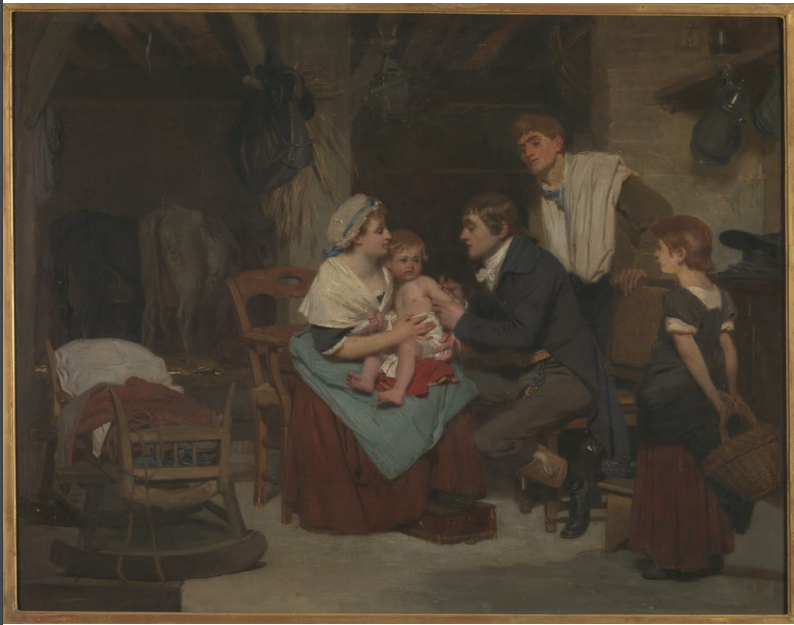What the end of smallpox teaches us about the search for a Covid-19 vaccine
Forty years ago this month, the World Health Assembly officially declared the world free of smallpox. Almost two centuries earlier, Gloucestershire physician Edward Jenner published a pamphlet on his belief that vaccination could eradicate the disease. Jenner’s story is a reminder of scientific persistence and patience, but also reveals a different narrative on science, faith and the natural world to some of those used by politicians and the media in the response to Covid-19.
During his apprenticeship as a surgeon, the teenaged Jenner overheard a milkmaid repeat a popular belief that she could not have smallpox because she had a cowpox sore on her hand from milking. Although such stories were dismissed as nonsense by many doctors, over the next thirty years Jenner studied the claim. In 1796 he took material from a cowpox pustule on the hand of a dairymaid, Sarah Nelmes, and vaccinated eight-year-old James Phipps, who was rendered immune to smallpox as a result. After initial opposition, Jenner’s work became the foundation that would lead to a world free of the smallpox disease.

Credit: Edward Jenner vaccinating a boy. Oil painting by E.-E. Hillemacher, 1884.
It is interesting that Jenner didn’t speak of the search for a smallpox vaccine as a battle or crusade against a malevolent natural enemy. He was passionate for truth and the relief of human suffering, and he also had a deep love of nature, spanning fossil-hunting to zoology, informed by his Christian faith in creation. Jenner’s pursuit of truth and goodness, reverence for the Creator, and desire to prevent or relieve human suffering framed his view of science.
This mind-set is evident in a letter to a friend written when he felt he had sufficient evidence for the validity of his discovery. Jenner says:
“While the vaccine discovery was progressive, the joy I felt at the prospect before me of being the instrument destined to take away from the world one of its greatest calamities, blended with the fond hope of enjoying independence and domestic peace and happiness, was often so excessive, that in pursuing my favourite subject among the meadows, I have sometimes found myself in a kind of revery. It is pleasant to me to recollect that these reflections always ended in devout acknowledgements to that Being from whom this and all other mercies flow.” (Davis, N.S., 1896 p.919.)
Jenner’s faith also energised his practice, providing his vaccine for the poor in his home. Jenner’s view of his vaccine was as a solution to a problem, providing relief from human suffering. This is very different to some of the narratives of warfare employed by present-day politicians, in particular Prime Minister Boris Johnson and President Donald Trump, when discussing coronavirus. In the search for a vaccine and our fervent action against illness and death, it may be easy to see the natural world as something to be conquered and subjugated, and science as the only source of salvation.
However, this can lead to an arrogant sense of human mastery over nature. To see the science and technology of human discovery in a battle with nature raises human beings to the position of wanting to be victors over nature. This is a dangerous view which has often contributed to our abuse of the environment.
Rather, as Donald MacKay (1922–1987), a British physicist, likened it, science can be compared to a child exploring their family garden — a place of wonder, mystery, and a measure of danger to be coped with. A garden could not be further from a battlefield.
Covid-19 reminds me of my vulnerability, and therefore the need to respect the natural world. My Christian faith energises me in the task to eradicate the virus either by social distancing or by the search for a vaccine. And in Jenner, a commitment to truth, compassion for the poor, faith and patience provide me with an outstanding model that might inform any exit strategy from our current crisis.
YOU MAY ALSO LIKE
Extinction is a big and sometimes overwhelming topic. It’s hard to get our brains around the scope of extinction in geological time, and to make sense of human responsibility in the present. Does God will...

